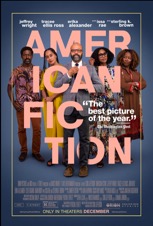American Fiction (R)
03/04/24 22:57 Filed in: 2023

Starring: Jeffrey Wright
December 2023
Warning! This is NOT a movie review. This is a critique of the film. Intended to initiate a dialogue, the following analysis explores various aspects of the film and may contain spoilers. For concerns over objectionable content, please first refer to one of the many parental movie guide websites. Ratings are based on a four star system. Happy reading!
American Fiction is just that…a work of fiction. And, as with any decent work of fiction, it weaves many themes into its narrative tapestry.
It’s a coming home story; a plot device that always yields dramatic tension and character conflict.
It’s the story about the loss of a sibling and the slow decline of an aging parent in the advancing stages of Alzheimer’s.
It’s also a canny examination of the current state of book publishing, which, according to the movie, is shamelessly imitative, hopelessly addicted to virtue signaling and solely focused on the bottom line (what else is new?).
The most obvious, and potentially controversial, theme here is the dangers of racial stereotypes.
Professor/author Thelonious “Monk” Ellison (Jeffrey Wright) tells his sister over the phone that he doesn’t see things in terms of race. That claim is immediately tested when a white man takes the taxi he was hailing.
While visiting a local bookstore, Monk rails at an employee for placing his book in the African American Studies section. “The blackest thing in this book,” Monk tells the frazzled young man, “is the ink.”
Monk’s guiding philosophy, which is overtly stated in the early stages of the film, is that the “black experience” in America isn’t solely characterized by gangster rap and kids raised by a single mom or grandparents. But his worldview is challenged at every turn, by his family, colleagues, and even one of his white students who takes offense when he writes the “N” word on the whiteboard. Monk tells her, “If I can get over it, so can you.”
Such statements land Monk in hot water with the school board, which forces him to take a leave of absence. This turns out to be a blessing in disguise as it allows Monk to focus on his fading mother. Another unexpected boon comes when Monk meets his mother’s neighbor, Coraline (Erika Alexander). He starts dating Coraline, but as with every relationship in Monk’s life, things get complicated.
Putting his time off to good use, Monk churns out a book. Written on a lark, Monk sends his book—a derivative, pandering tale of a black ex-con who guns down his own father (Keith David)—to his agent, Arthur (John Ortiz). After reading the manuscript, Arthur doubts he’ll be able to find a publisher for the book. He’s proven wrong when one publisher offers to pay handsomely for rights to the book.
Now Monk is caught in a moral dilemma: will he hold firm to his convictions and turn down the deal, or sell out to make bank, which will help defray the exorbitant costs of his mother’s nursing home? This is yet another of the movie’s many themes: how unforeseen circumstances can force us into becoming the very thing we despise (often for financial gain).
Monk’s younger brother, Clifford Ellison (Sterling K. Brown), recently divorced his wife and now dates men. Cliff is a plastic surgeon who claims to be cash-strapped, yet always seems to have as much blow as he wants. It’s ironic that all the money he makes from fixing noses goes up his own. If there’s such a thing as a “functional deadbeat,” Cliff would definitely qualify.
Though he plays a fairly unsympathetic character, Brown gives a terrific performance (and wow is he cut). His character is redeemed during a wedding reception scene when Cliff tells Monk that people want to love him. It’s a touching scene between two brothers whose personalities are as diametrically opposed as Earth’s poles.
Ortiz infuses some much-needed levity into the largely glum proceedings. The scenes where Arthur and Monk talk to the book editors via speakerphone are uproariously funny. The movie boasts fine acting all around, and Wright is the glue that holds everything together. He delivers a finely-modulated, Oscar-worthy performance.
There are other pluses here too: the beautiful Atlantic coast locations, the brilliant light jazz score and the “choose your own ending” story device.
So, amid its many themes, what does the movie really tell us?
Perhaps that many modern black families are different than the stereotypes often portrayed in movies, TV shows, books and the media?
Perhaps that some black people don’t see their lives, or even society as a whole, through a racist lens?
Perhaps that our nation isn’t as divided as some would have us believe?
If you find any of these statements offensive, don’t worry.
It’s all just fiction.
Rating: 3 out of 4